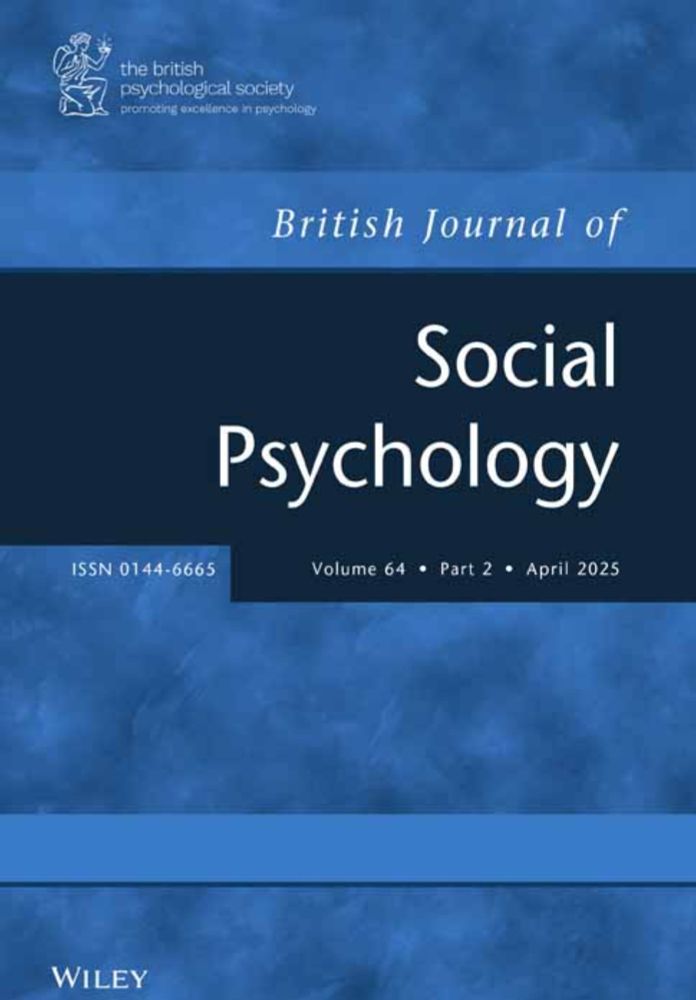
Juliane Degner
@julianedegner.bsky.social
Social Psychologist • Researcher • Head of Social Cognition Group at Universität Hamburg • researches person perception, group attitudes, and social identity
You beat me to posting about our own paper 😅
Really appreciate the shoutout!"
Really appreciate the shoutout!"
November 9, 2025 at 6:08 AM
You beat me to posting about our own paper 😅
Really appreciate the shoutout!"
Really appreciate the shoutout!"
𝗛𝘂𝗴𝗲 𝗰𝗼𝗻𝗴𝗿𝗮𝘁𝘀 𝘁𝗼 𝗝𝗼𝗲𝗹𝗹𝗲 𝗳𝗼𝗿 𝗹𝗲𝗮𝗱𝗶𝗻𝗴 𝘁𝗵𝗶𝘀 𝗶𝗺𝗽𝗿𝗲𝘀𝘀𝗶𝘃𝗲 𝘄𝗼𝗿𝗸!
This is just the start— keep an eye out for more standout contributions from her in the future.
(5/5)
This is just the start— keep an eye out for more standout contributions from her in the future.
(5/5)
November 9, 2025 at 6:03 AM
𝗛𝘂𝗴𝗲 𝗰𝗼𝗻𝗴𝗿𝗮𝘁𝘀 𝘁𝗼 𝗝𝗼𝗲𝗹𝗹𝗲 𝗳𝗼𝗿 𝗹𝗲𝗮𝗱𝗶𝗻𝗴 𝘁𝗵𝗶𝘀 𝗶𝗺𝗽𝗿𝗲𝘀𝘀𝗶𝘃𝗲 𝘄𝗼𝗿𝗸!
This is just the start— keep an eye out for more standout contributions from her in the future.
(5/5)
This is just the start— keep an eye out for more standout contributions from her in the future.
(5/5)
The takeaway:
Classic models of social identification don’t fully capture the experiences of stigmatized groups: Identification isn’t tied to positive group evaluation — people can strongly identify even with negatively viewed groups.
Time for more inclusive, context-sensitive theorizing (!)
(4/5)
Classic models of social identification don’t fully capture the experiences of stigmatized groups: Identification isn’t tied to positive group evaluation — people can strongly identify even with negatively viewed groups.
Time for more inclusive, context-sensitive theorizing (!)
(4/5)
November 9, 2025 at 6:03 AM
The takeaway:
Classic models of social identification don’t fully capture the experiences of stigmatized groups: Identification isn’t tied to positive group evaluation — people can strongly identify even with negatively viewed groups.
Time for more inclusive, context-sensitive theorizing (!)
(4/5)
Classic models of social identification don’t fully capture the experiences of stigmatized groups: Identification isn’t tied to positive group evaluation — people can strongly identify even with negatively viewed groups.
Time for more inclusive, context-sensitive theorizing (!)
(4/5)
What explains this diversity?
Both group-level factors (e.g., socioeconomic position, group entitativity) and individual belief systems (e.g., perceived permeability, legitimacy) shape social identification.
Social identity is both 𝘱𝘦𝘳𝘴𝘰𝘯𝘢𝘭 and 𝘤𝘰𝘯𝘵𝘦𝘹𝘵𝘶𝘢𝘭.
(3/5)
Both group-level factors (e.g., socioeconomic position, group entitativity) and individual belief systems (e.g., perceived permeability, legitimacy) shape social identification.
Social identity is both 𝘱𝘦𝘳𝘴𝘰𝘯𝘢𝘭 and 𝘤𝘰𝘯𝘵𝘦𝘹𝘵𝘶𝘢𝘭.
(3/5)
November 9, 2025 at 6:03 AM
What explains this diversity?
Both group-level factors (e.g., socioeconomic position, group entitativity) and individual belief systems (e.g., perceived permeability, legitimacy) shape social identification.
Social identity is both 𝘱𝘦𝘳𝘴𝘰𝘯𝘢𝘭 and 𝘤𝘰𝘯𝘵𝘦𝘹𝘵𝘶𝘢𝘭.
(3/5)
Both group-level factors (e.g., socioeconomic position, group entitativity) and individual belief systems (e.g., perceived permeability, legitimacy) shape social identification.
Social identity is both 𝘱𝘦𝘳𝘴𝘰𝘯𝘢𝘭 and 𝘤𝘰𝘯𝘵𝘦𝘹𝘵𝘶𝘢𝘭.
(3/5)
The study asks: How do people from different stigmatized groups identify with their ingroups?
Across 18 groups in the U.S., we found that the widely used multicomponent ingroup identification model doesn’t fit these groups particularly well — identity structures vary substantially.
(2/5)
Across 18 groups in the U.S., we found that the widely used multicomponent ingroup identification model doesn’t fit these groups particularly well — identity structures vary substantially.
(2/5)
November 9, 2025 at 6:03 AM
The study asks: How do people from different stigmatized groups identify with their ingroups?
Across 18 groups in the U.S., we found that the widely used multicomponent ingroup identification model doesn’t fit these groups particularly well — identity structures vary substantially.
(2/5)
Across 18 groups in the U.S., we found that the widely used multicomponent ingroup identification model doesn’t fit these groups particularly well — identity structures vary substantially.
(2/5)
Huge thanks to co-author @yarrowdunham.bsky.social — and congratulations again to first author Feline!
October 28, 2025 at 12:44 PM
Huge thanks to co-author @yarrowdunham.bsky.social — and congratulations again to first author Feline!
We aimed to study effects of linguistic abstractedness, but different types of group labels (adjectives vs. nouns) didn’t significantly influence children’s group attitudes — behavior spoke louder than words.
October 28, 2025 at 12:44 PM
We aimed to study effects of linguistic abstractedness, but different types of group labels (adjectives vs. nouns) didn’t significantly influence children’s group attitudes — behavior spoke louder than words.
However, children didn’t extend those attitudes to unfamiliar group members. They seem to notice social patterns but remain cautious about generalizing — showing early nuance in how they think about groups.
October 28, 2025 at 12:44 PM
However, children didn’t extend those attitudes to unfamiliar group members. They seem to notice social patterns but remain cautious about generalizing — showing early nuance in how they think about groups.
We found that children form attitudes about social groups based on how group members behave — even when those behaviors don’t perfectly match group membership.
October 28, 2025 at 12:44 PM
We found that children form attitudes about social groups based on how group members behave — even when those behaviors don’t perfectly match group membership.
This is Feline’s first first-author publication — CONGRATULATIONS!
October 28, 2025 at 12:44 PM
This is Feline’s first first-author publication — CONGRATULATIONS!
I raise some overdue (and slightly uncomfortable) questions about ecological validity, downstream consequences, and individual and cultural differences.
It’s not comprehensive—but hopefully a step toward deeper conversations about how to move the field forward.
It’s not comprehensive—but hopefully a step toward deeper conversations about how to move the field forward.
June 27, 2025 at 8:27 AM
I raise some overdue (and slightly uncomfortable) questions about ecological validity, downstream consequences, and individual and cultural differences.
It’s not comprehensive—but hopefully a step toward deeper conversations about how to move the field forward.
It’s not comprehensive—but hopefully a step toward deeper conversations about how to move the field forward.
After years of thinking (and occasionally obsessing) about STIs, I finally put it all on paper.
Part critique, part love letter, the piece revisits a few selected issues in STI research—not everything, but some things that might be worth a closer look.
Part critique, part love letter, the piece revisits a few selected issues in STI research—not everything, but some things that might be worth a closer look.
June 27, 2025 at 8:27 AM
After years of thinking (and occasionally obsessing) about STIs, I finally put it all on paper.
Part critique, part love letter, the piece revisits a few selected issues in STI research—not everything, but some things that might be worth a closer look.
Part critique, part love letter, the piece revisits a few selected issues in STI research—not everything, but some things that might be worth a closer look.
Happy to have found a home for this research in the British Journal of Social Psychology: doi.org/10.1111/bjso...

<em>British Journal of Social Psychology</em> | Wiley Online Library
System Justification Theory (SJT) proposes that members of disadvantaged groups perceive norms to express ingroup positivity. Adherence to these norms is assumed to result in open expressions of ingr...
doi.org
April 4, 2025 at 12:05 PM
Happy to have found a home for this research in the British Journal of Social Psychology: doi.org/10.1111/bjso...
4/4
This paper is an incredible accomplishment for an early career-researcher!
Check it out!
onlinelibrary.wiley.com/doi/10.1002/...
This paper is an incredible accomplishment for an early career-researcher!
Check it out!
onlinelibrary.wiley.com/doi/10.1002/...
onlinelibrary.wiley.com
March 3, 2025 at 9:46 AM
4/4
This paper is an incredible accomplishment for an early career-researcher!
Check it out!
onlinelibrary.wiley.com/doi/10.1002/...
This paper is an incredible accomplishment for an early career-researcher!
Check it out!
onlinelibrary.wiley.com/doi/10.1002/...
3/4
With its solid theoretical foundation, the paper allows to derive research questions and hypotheses that will guide future research for years to come.
Added plus: The paper also provides THE most comprehensive literature review of existing research on Mixed identities.
With its solid theoretical foundation, the paper allows to derive research questions and hypotheses that will guide future research for years to come.
Added plus: The paper also provides THE most comprehensive literature review of existing research on Mixed identities.
March 3, 2025 at 9:46 AM
3/4
With its solid theoretical foundation, the paper allows to derive research questions and hypotheses that will guide future research for years to come.
Added plus: The paper also provides THE most comprehensive literature review of existing research on Mixed identities.
With its solid theoretical foundation, the paper allows to derive research questions and hypotheses that will guide future research for years to come.
Added plus: The paper also provides THE most comprehensive literature review of existing research on Mixed identities.
2/4
The paper delves into the complexities of the social identification processes for Mixed individuals, examining how individual and contextual factors may shape their self-categorization and social identification.
The paper delves into the complexities of the social identification processes for Mixed individuals, examining how individual and contextual factors may shape their self-categorization and social identification.
March 3, 2025 at 9:46 AM
2/4
The paper delves into the complexities of the social identification processes for Mixed individuals, examining how individual and contextual factors may shape their self-categorization and social identification.
The paper delves into the complexities of the social identification processes for Mixed individuals, examining how individual and contextual factors may shape their self-categorization and social identification.
2/4
The paper delves into the complexities of the social identification processes for Mixed individuals, examining how individual and contextual factors may shape their self-categorization and social identification.
The paper delves into the complexities of the social identification processes for Mixed individuals, examining how individual and contextual factors may shape their self-categorization and social identification.
March 3, 2025 at 9:39 AM
2/4
The paper delves into the complexities of the social identification processes for Mixed individuals, examining how individual and contextual factors may shape their self-categorization and social identification.
The paper delves into the complexities of the social identification processes for Mixed individuals, examining how individual and contextual factors may shape their self-categorization and social identification.
Yet there is a handful of studies in which spontaneous trait inferences from (unambiguous) behaviors were moderated by stereotype congruency. We aimed at investigating the underlying mechanism of this effect - but were unable to find it…
November 24, 2023 at 4:08 PM
Yet there is a handful of studies in which spontaneous trait inferences from (unambiguous) behaviors were moderated by stereotype congruency. We aimed at investigating the underlying mechanism of this effect - but were unable to find it…

